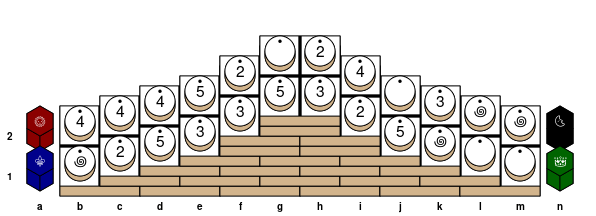ppgames is an R package with functions that help generate piecepack game graphics, rulesets, and books as well as functions to parse Portable Piecepack Notation (PPN) files and a Fuji-san solver. This package uses the piecepackr package.
Contents
To install the ppgames R package use the following commands in R:
install.packages("remotes")
remotes::install_github("piecepackr/piecepackr")
remotes::install_github("piecepackr/ppgames")If you want to make rulebooks and rulesets you'll need xelatex and depending on the input/output targets also a recent version of pandoc. The following instructions should work on Ubuntu:
sudo apt install texlive-xetex
sudo apt install cabal-install
cabal update # add $HOME/.cabal/bin to $PATH
cabal install pandocUnless otherwise specified the rulesets and rulebooks in the inst directory are licensed under the CC BY-SA 4.0 license. The code in the R, inst/ppn, inst/shiny, man, and tests data are dual-licensed under the MIT license.
This package provides some prototype configurable rulesets and one work-in-progress rulebook. One can use save_pamphlet(), save_ruleset(), and save_rulebook() to generate them. This web page lists which piecepack games we support ruleset generation for.
library("piecepackr")
library("ppgames")
cfg <- pp_cfg() # replace with your favoured configuration
gk <- game_kit(cfgs=list(cfg=cfg))
save_ruleset("nine-mens-morris", gk=gk)
download.file("https://trevorldavis.com/piecepackr/share/demo_cfgs.RData", "demo_cfgs.RData")
cfgs <- new.env()
load("demo_cfgs.RData", envir=cfgs)
gk <- game_kit(cfgs=list(cfg=cfgs$orthodox1))
save_rulebook("the-historical-piecepacker", gk=gk)This package provides several starting boards in the data frame format accepted by piecepackr::pmap_piece() and cat_piece() that can also be used to setup games in the PPN format:
See the package documentation and the this web page for more information and a full list of supported games.
cfg <- pp_cfg(list(suit_text="🌞,🌜,👑,⚜,꩜",
suit_cex="0.6,0.7,0.75,0.9,0.9",
suit_fontfamily="Noto Emoji,Noto Sans Symbols2,Noto Emoji,Noto Sans Symbols,Noto Sans Cham",
suit_color="darkred,black,darkgreen,darkblue,black",
border_lex=4, border_color="black", mat_width.tile_back=0.05, mat_color="white",
invert_colors.suited = TRUE, edge_color.coin="tan", edge_color.tile="tan",
shape.pawn="convex6", depth.pawn=1.0, height.pawn=0.75, width.pawn=0.75, dm_text.pawn=""
))
pmap_piece(df_tablut(die_width=0.5), cfg=cfg, default.units="in", trans=op_transform, op_scale=0.7)This package provides a prototype plaintext Unicode diagram generator. One can use cat_piece() to print out diagrams to the terminal using the same data.frame() input accepted by piecepackr::pmap_piece() or one can use cat_move() to print out diagrams using the parsed PPN games provided by read_ppn():
cat_piece(df_fide_chess())cat_piece(df_xiangqi())This package provides a prototype Portable Piecepack Notation parser. One can use read_ppn() to parse a PPN file and use animate_game(), plot_move(), and cat_move() to visualize the moves in a parsed game:
game <- read_ppn(system.file("ppn/four-field-kono.ppn", package="ppgames"))[[1]]
animate_game(game)
plot_move(game)
cat_move(game)This package provides a Fuji-san solver solve_fujisan() which can compute the shortest solution (if it exists) to a given Fuji-san puzzle and output the PPN text to record/visualize the solution.
puzzle2 <- matrix(c(4,4,4,5,2,0,2,4,0,3,1,1,
1,2,5,3,3,5,3,2,5,1,0,0), nrow=2, byrow=TRUE)
s2 <- solve_fujisan(coins=puzzle2)
game <- read_ppn(textConnection(s2$ppn))[[1]]
dark_colorscheme <- list(suit_color="darkred,black,darkgreen,darkblue,black",
invert_colors.suited=TRUE, border_color="black", border_lex=2)
piecepack_suits <- list(suit_text="\U0001f31e,\U0001f31c,\U0001f451,\u269c,\uaa5c", # 🌞,🌜,👑,⚜,꩜
suit_fontfamily="Noto Emoji,Noto Sans Symbols2,Noto Emoji,Noto Sans Symbols,Noto Sans Cham",
suit_cex="0.6,0.7,0.75,0.9,0.9")
traditional_ranks <- list(use_suit_as_ace=TRUE, rank_text=",a,2,3,4,5")
cfg3d <- list(width.pawn=0.75, height.pawn=0.75, depth.pawn=0.375,
dm_text.pawn="", shape.pawn="convex6", invert_colors.pawn=TRUE,
edge_color.coin="tan", edge_color.tile="tan")
cfg <- pp_cfg(c(piecepack_suits, dark_colorscheme, traditional_ranks, cfg3d))
animate_game(game, op_scale=1, op_angle=90, trans=op_transform, cfg=cfg, file="fujisan.gif")


